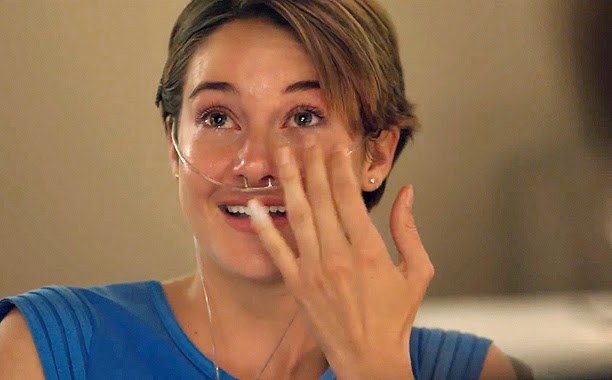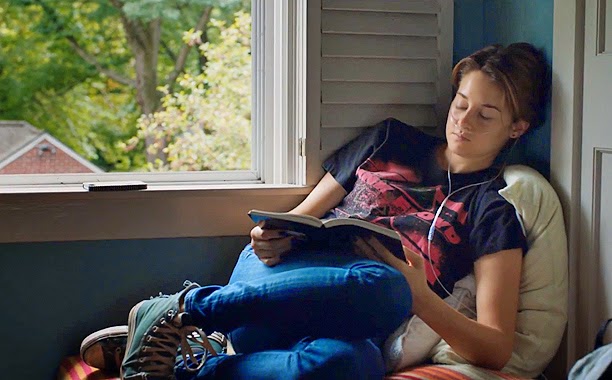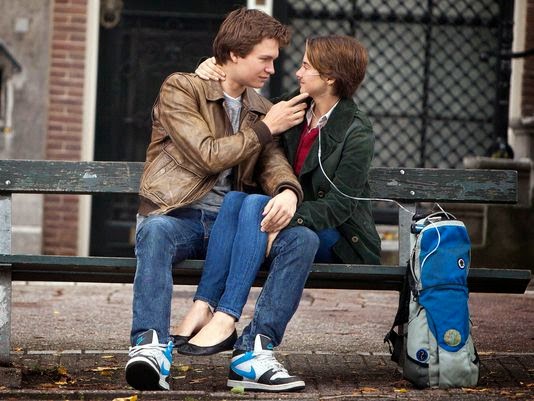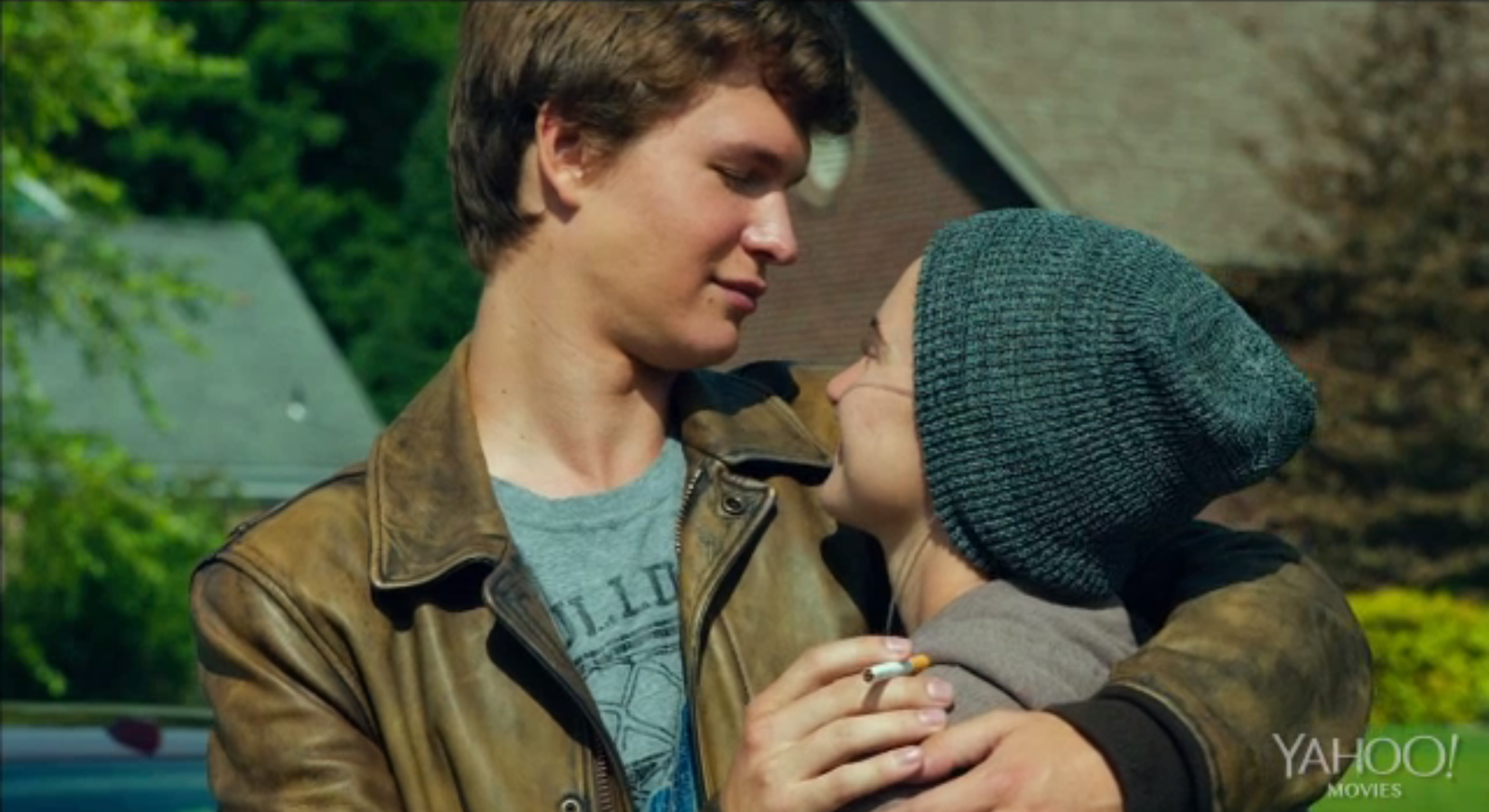I am not a particularly sentimental person. That shouldn't come as a shock to anyone. So, when I say that I didn't cry at the end of The Fault In Our Stars, I hope you understand that this doesn't mean the ending was unaffecting or unemotional or not good, it just means that it didn't make me, personally, cry. And that means crap.
It does, however, mean a little something that I did cry when I read the book. I cried a lot. Ugly crying, just like you're supposed to. And I was kind of miffed as I walked out of the theater, trying to figure out why, when I so clearly had a strong emotional reaction to the book, I didn't have a commensurate one for the movie. I think I know why.
You see, the movie of The Fault In Our Stars (which is obviously what we're discussing today), is faithful to the book. Very faithful. Actually, I would argue, possibly faithful to its detriment. No, it's not a bad movie. It's a very good one, actually. But I think it might have been a great movie if it hadn't been so blatantly terrified of offending its fanbase, so scared that it didn't even dare change one little line of dialogue.
It was faithful to such an extreme, that I actually didn't have any strong feelings while watching the movie, because nothing in the movie surprised me. At all. I already knew everything that was going to happen, but not just in the way that I am ready for any spoilers on Game of Thrones but still anticipate seeing them and am still freaked the hell out when they happen. No, it was more like this movie was just the filmed version of the book with literally no changes made, and while that's nice, and certainly gratifying for John Green, it left me in the audience feeling a little, I don't know, cheated?
Just kind of meh, I guess. Because I already knew the story, and that meant that there wasn't anything to discover. Nothing was added when they adapted this story to film, and in the lack of anything being added, I think something was actually lost.
For those of you who have somehow avoided this phenomenon, here's the gist: Hazel Grace Lancaster (Shailene Woodley) is a seventeen year old girl who just so happens to have Stage IV thyroid cancer and tumors in her lungs. She's terminal. She's been terminal for a while, and she very well could continue to live for some time yet, but we're never left with any idea that she might make a full recovery and lead a totally normal life. Nope. Hazel Grace is dying, and that's sad.
She's also a bit isolated - by her own choice - spending almost all of her time with her mother and father (Laura Dern and Sam Trammel), at least until one day when she runs into a cute boy at the support group meeting her mom makes her attend. That boy's name is Augustus Waters (Ansel Elgort), and he is a total Manic Pixie Dream Boy - more on that later - at least at first. As she gets to know Augustus, though, Hazel starts to come out of her shell and live a little before she dies.
They do very teenager in love things, like pranks and reading the same books and texting and being cute. Eventually, Hazel gets Gus into this book she loves, and they start to correspond with the author, which leads to a trip overseas to meet the writer. They fall in love in Amsterdam in the city, and everything is cute and coming of age and very sweet, except for (arguably because of) the whole impending mortality due to cancer thing.
Then they come home and shit gets real because, you know, cancer, and everything is sad. I'm trying not really to write any spoilers in here, and I think I'm doing a good job, but I've got to explain some of the story for this to work.
Anyway, like I said, the movie is very faithful to the book, which is a good marketing decision. The book is a New York Times Bestseller, extremely critically acclaimed, and recently got mentioned in an episode of Orange Is The New Black, which is the height of stardom for a literary work. It has a lot of fans. And those fans are kind of terrifying in their intensity. (Incidentally, please don't eat me, rabid fans...)
Because the book is so beloved and so inspirational, and because the writer, John Green, has such a strong fandom of his own, I can see why the screenwriters and director and actors all wanted to steer as close to the source material as humanly possible. I get it. But the problem is, the source material is a book. This movie is a movie. And those are two very different mediums.
Look, I teach creative writing. I got my Master's degree in it (don't do that, it's a waste of money - fun, though). And one of the most helpful things they taught us was that the medium in which you are telling a story determines how the story will be told. To some extent, that is obvious. Television and film are really different because a movie has a defined beginning and end, whereas a television show has a defined beginning, but not so much with the end. Similarly, novels are different from comics, because a novel stops, and a comic can keep going or stop or reboot or whatever. They're different ways of telling stories.
The Fault In Our Stars was written to be a novel, and you can tell. How can you tell? Well, for starters, the main thrust of the storytelling is the emotional journey (facilitated by romance) of a teenage girl. That's not a criticism, for the record. It's great. It's just that the entire point of the book is the inward path of this character. We're inside her head and we're completely focused on her internal world. As a result, everything that actually happens, all the plot points, fade into the background compared to the emotional transformation that she is undergoing. So much of the book is about her inner monologue and her thoughts.
You just can't do that in a movie. It's a visual medium. Sure, you can have Hazel talking in a voiceover, which they do, but it's not the same. We live the entire book inside of Hazel's brain, and having a couple of lines of voiceover in the movie just isn't really covering it. And when we transfer to a visual medium, all of that background plot stuff actually gains more importance, because that's what we see. So it'd better be good.
Except it's just kind of meh. We've lost Hazel's internal world, but we haven't really gained a plot that will compensate for that. The novel meanders and goes on tangents and is quiet and slow, and that's fine, because it's a novel. But the movie does that too, and that's less fine, because this is a movie, and we need to actually visually represent the transformation that is happening. To some extent that can be done through acting, and the actors in this film certainly did an amazing job, but there is a level on which the transformation absolutely must be presented through plot. It's just how movies work.
That is why, for my money, the first half of the movie kind of sucks. Nothing happens except Hazel and Gus texting a lot, and it's cute and all, but I feel like it could have been cut down to about fifteen minutes and I would have felt the same about. The second half of the film, however, was amazing, because that's the part where stuff actually starts happening and we see the characters changed by the circumstances in their lives.
Again, though, this gets back to the whole thing where I'm not an overly sentimental or sweet person. I don't actually have an intense desire to watch two teenagers fall in love. At least not in this case. For me, the remarkable part of this story is not that they fall in love, it's how that love changes them and informs their decisions from that point on. The second half of the story is where the really compelling character development happens.
It's where Augustus goes from being a Manic Pixie Dream Boy to being a genuine human being in pain and fear and anger, and where Hazel goes from being a dreamy protagonist to being a person with convictions who takes decisive action. Plus, the second half has a lot more of Isaac (Nat Wolff) in it, and that's always a plus.
The larger point I'm making isn't that the movie is bad or anything. It's not. But it's also not as good as it could have been. Because they were so afraid of offending the fans that they created a very literal representation of the book, the filmmakers have created a movie that is less emotionally affecting than its source material. The book works because it's a book. The movie is basically just that same book, with pictures, and as a result, it's good, but it's not great.
Here's what I would have done. I wouldn't have made any major plot changes, because that would be a terrible idea, but I would have cut down on the beginning part. I would have made all of that a lot shorter, and then expanded the film post-Amsterdam. The hard, emotional, angry stuff would be the bulk of the movie, because, to me, that's what the story is actually about. Yeah, the teenagers fall in love and kiss and that's cute. But the story is really about what happens next. What happens when you fall in love and you're in love and everything is wonderful but you're still dying.
That's what the story really is, and it's why it's so deep and true and real. By focusing so much on the beginning of their love story, I honestly feel that the movie is doing exactly what it claims to hate.
They're sugarcoating it.
It does, however, mean a little something that I did cry when I read the book. I cried a lot. Ugly crying, just like you're supposed to. And I was kind of miffed as I walked out of the theater, trying to figure out why, when I so clearly had a strong emotional reaction to the book, I didn't have a commensurate one for the movie. I think I know why.
You see, the movie of The Fault In Our Stars (which is obviously what we're discussing today), is faithful to the book. Very faithful. Actually, I would argue, possibly faithful to its detriment. No, it's not a bad movie. It's a very good one, actually. But I think it might have been a great movie if it hadn't been so blatantly terrified of offending its fanbase, so scared that it didn't even dare change one little line of dialogue.
It was faithful to such an extreme, that I actually didn't have any strong feelings while watching the movie, because nothing in the movie surprised me. At all. I already knew everything that was going to happen, but not just in the way that I am ready for any spoilers on Game of Thrones but still anticipate seeing them and am still freaked the hell out when they happen. No, it was more like this movie was just the filmed version of the book with literally no changes made, and while that's nice, and certainly gratifying for John Green, it left me in the audience feeling a little, I don't know, cheated?
Just kind of meh, I guess. Because I already knew the story, and that meant that there wasn't anything to discover. Nothing was added when they adapted this story to film, and in the lack of anything being added, I think something was actually lost.
For those of you who have somehow avoided this phenomenon, here's the gist: Hazel Grace Lancaster (Shailene Woodley) is a seventeen year old girl who just so happens to have Stage IV thyroid cancer and tumors in her lungs. She's terminal. She's been terminal for a while, and she very well could continue to live for some time yet, but we're never left with any idea that she might make a full recovery and lead a totally normal life. Nope. Hazel Grace is dying, and that's sad.
She's also a bit isolated - by her own choice - spending almost all of her time with her mother and father (Laura Dern and Sam Trammel), at least until one day when she runs into a cute boy at the support group meeting her mom makes her attend. That boy's name is Augustus Waters (Ansel Elgort), and he is a total Manic Pixie Dream Boy - more on that later - at least at first. As she gets to know Augustus, though, Hazel starts to come out of her shell and live a little before she dies.
They do very teenager in love things, like pranks and reading the same books and texting and being cute. Eventually, Hazel gets Gus into this book she loves, and they start to correspond with the author, which leads to a trip overseas to meet the writer. They fall in love in Amsterdam in the city, and everything is cute and coming of age and very sweet, except for (arguably because of) the whole impending mortality due to cancer thing.
Then they come home and shit gets real because, you know, cancer, and everything is sad. I'm trying not really to write any spoilers in here, and I think I'm doing a good job, but I've got to explain some of the story for this to work.
Anyway, like I said, the movie is very faithful to the book, which is a good marketing decision. The book is a New York Times Bestseller, extremely critically acclaimed, and recently got mentioned in an episode of Orange Is The New Black, which is the height of stardom for a literary work. It has a lot of fans. And those fans are kind of terrifying in their intensity. (Incidentally, please don't eat me, rabid fans...)
Because the book is so beloved and so inspirational, and because the writer, John Green, has such a strong fandom of his own, I can see why the screenwriters and director and actors all wanted to steer as close to the source material as humanly possible. I get it. But the problem is, the source material is a book. This movie is a movie. And those are two very different mediums.
Look, I teach creative writing. I got my Master's degree in it (don't do that, it's a waste of money - fun, though). And one of the most helpful things they taught us was that the medium in which you are telling a story determines how the story will be told. To some extent, that is obvious. Television and film are really different because a movie has a defined beginning and end, whereas a television show has a defined beginning, but not so much with the end. Similarly, novels are different from comics, because a novel stops, and a comic can keep going or stop or reboot or whatever. They're different ways of telling stories.
The Fault In Our Stars was written to be a novel, and you can tell. How can you tell? Well, for starters, the main thrust of the storytelling is the emotional journey (facilitated by romance) of a teenage girl. That's not a criticism, for the record. It's great. It's just that the entire point of the book is the inward path of this character. We're inside her head and we're completely focused on her internal world. As a result, everything that actually happens, all the plot points, fade into the background compared to the emotional transformation that she is undergoing. So much of the book is about her inner monologue and her thoughts.
You just can't do that in a movie. It's a visual medium. Sure, you can have Hazel talking in a voiceover, which they do, but it's not the same. We live the entire book inside of Hazel's brain, and having a couple of lines of voiceover in the movie just isn't really covering it. And when we transfer to a visual medium, all of that background plot stuff actually gains more importance, because that's what we see. So it'd better be good.
Except it's just kind of meh. We've lost Hazel's internal world, but we haven't really gained a plot that will compensate for that. The novel meanders and goes on tangents and is quiet and slow, and that's fine, because it's a novel. But the movie does that too, and that's less fine, because this is a movie, and we need to actually visually represent the transformation that is happening. To some extent that can be done through acting, and the actors in this film certainly did an amazing job, but there is a level on which the transformation absolutely must be presented through plot. It's just how movies work.
That is why, for my money, the first half of the movie kind of sucks. Nothing happens except Hazel and Gus texting a lot, and it's cute and all, but I feel like it could have been cut down to about fifteen minutes and I would have felt the same about. The second half of the film, however, was amazing, because that's the part where stuff actually starts happening and we see the characters changed by the circumstances in their lives.
Again, though, this gets back to the whole thing where I'm not an overly sentimental or sweet person. I don't actually have an intense desire to watch two teenagers fall in love. At least not in this case. For me, the remarkable part of this story is not that they fall in love, it's how that love changes them and informs their decisions from that point on. The second half of the story is where the really compelling character development happens.
It's where Augustus goes from being a Manic Pixie Dream Boy to being a genuine human being in pain and fear and anger, and where Hazel goes from being a dreamy protagonist to being a person with convictions who takes decisive action. Plus, the second half has a lot more of Isaac (Nat Wolff) in it, and that's always a plus.
The larger point I'm making isn't that the movie is bad or anything. It's not. But it's also not as good as it could have been. Because they were so afraid of offending the fans that they created a very literal representation of the book, the filmmakers have created a movie that is less emotionally affecting than its source material. The book works because it's a book. The movie is basically just that same book, with pictures, and as a result, it's good, but it's not great.
Here's what I would have done. I wouldn't have made any major plot changes, because that would be a terrible idea, but I would have cut down on the beginning part. I would have made all of that a lot shorter, and then expanded the film post-Amsterdam. The hard, emotional, angry stuff would be the bulk of the movie, because, to me, that's what the story is actually about. Yeah, the teenagers fall in love and kiss and that's cute. But the story is really about what happens next. What happens when you fall in love and you're in love and everything is wonderful but you're still dying.
That's what the story really is, and it's why it's so deep and true and real. By focusing so much on the beginning of their love story, I honestly feel that the movie is doing exactly what it claims to hate.
They're sugarcoating it.






Done. You have convinced me not to see it. :)
ReplyDeleteGood job me? :P
DeleteKOLKATA ESCORTS
ReplyDeleteKOLKATA ESCORT
KOLKATA ESCORT SERVICE
KOLKATA INDEPENDENT ESCORTS
KOLKATA INDEPENDENT ESCORT
ESCORT IN KOLKATA
ESCORTS IN KOLKATA
VILLAGE CALL GIRLS
VILLAGE CALL GIRL
CALL GIRL
CALL GIRLS
ESCORT
ESCORTS
KOLKATA FEMALE ESCORTS
KOLKATA HOTEL ESCORTS
KOLKATA MODEL ESCORTS
KOLKATA CALL GIRL
KOLKATA CALL GIRL SERVICE
KOLKATA CALL GIRL SERVICE
KOLKATA CALL GIRLS
CALL GIRL
CALL GIRLS
CALL GIRLS SERVICE
CALL GIRL SERVICE
KOLKATA INDEPENDENT CALL GIRLS
KOLKATA INDEPENDENT CALL GIRL
ESCORT
KOLKATA ESCORTS
KOLKATA ESCORT